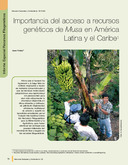Importancia del acceso a recursos genéticos de Musa en América Latina y el Caribe

View/
ISSN
ISSN: 1659-1216Date
04-2008Author
Vézina, Anne
Type
Artículo
Metadata
Show full item recordAlternative title
The importance of accessing Musa genetic
resources for Latin America and the Caribbean.
Description
9 páginas, ilustrado, 4 figuras, 1 tabulación, 13 referencias.
Abstract
Latinoamérica y el Caribe producen tanto banano
como la región asiática, pero a diferencia de esta,
no albergan variedades locales domesticadas ni
especies silvestres cuyos genes puedan emplearse para obtener bananos mejorados capaces
de luchar contra las enfermedades y adaptarse
al cambio climático. Una parte importante del
reservorio genético del cultivo se conserva en
bancos genéticos y está disponible para la comu nidad mundial de investigadores a través de la
red internacional de bancos genéticos ex situ; sin
embargo, la incertidumbre política y legal en cuanto
al intercambio de recursos genéticos hace difícil
adquirir nuevos materiales con el fin de distribuirlos
mundialmente para actividades de investigación y
mejoramiento genético. El sistema multilateral de
acceso a los recursos fitogenéticos y distribución
equitativa de beneficios, creado por el Tratado
Internacional sobre los Recursos Fitogenéticos
para la Alimentación y la Agricultura, debe contri buir a eliminar obstáculos al intercambio de germoplasma y ayudar a los agricultores y científicos
a encontrar soluciones sostenibles para los problemas que afectan la producción de banano. The Latin American and Caribbean region produces as many bananas as the Asian region but, unlike
the latter, it does not harbour locally domesticated
varieties and wild species whose genes could be
used to breed bananas that are better at fighting
diseases or adapting to climate change. A sig nificant share of the crop’s genepool is conserved
in genebanks, and made available globally to the
research community through the international net work of ex-situ genebanks; nonetheless, the politi cal and legal uncertainties regarding the exchange
of genetic resources have created challenges for
acquiring new materials that can subsequently be
made globally available for research and breed ing. The multilateral system of access and ben efit sharing created by the International Treaty on
Plant Genetic Resources for Food and Agriculture,
should help remove the main obstacles to the
exchange of germplasm and as such help farmers and scientists find sustainable solutions to the
problems plaguing bananas.
Keywords
Publisher
CATIE, Turrialba (Costa Rica) CATIE, Turrialba (Costa Rica)


